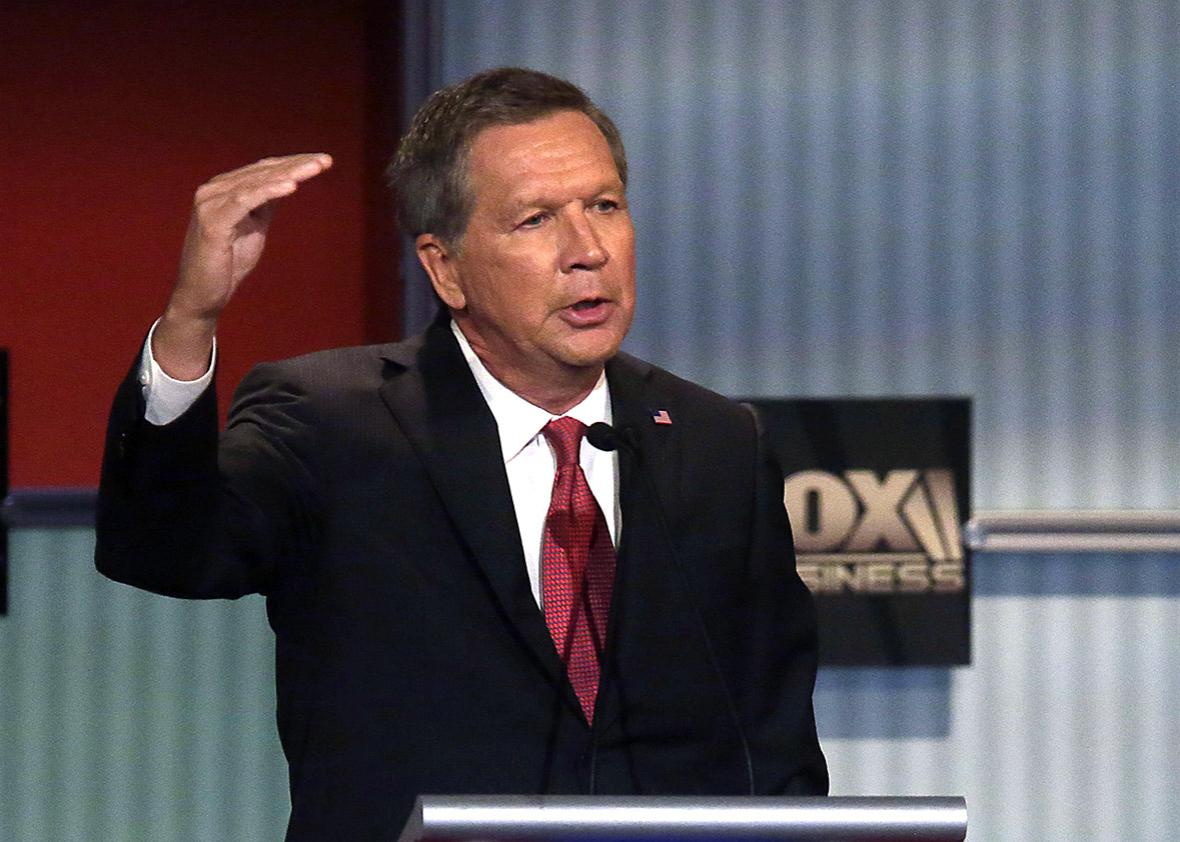When Ohio Gov. John Kasich announced his presidential bid, I and various other commentators suggested that he might be the 2016 cycle’s equivalent of Jon Huntsman: the relatively moderate GOP candidate whom media elites adore but who is despised by actual Republican voters, largely because the campaign strategy rests on telling actual Republican voters that they’re wrong. Not unimportantly, too, is the presence on each campaign of John Weaver, who guided Sen. John McCain to a strong if ultimately unsuccessful showing in the 2000 Republican presidential primaries and has been banking on that showing ever since.
At the time, Weaver did not take kindly to the comparisons between Huntsman and Kasich. “Every campaign is different, every race is different—that’s pack journalism at its most glib and lazy,” he told Bloomberg Politics. He added that Kasich “is a conservative’s conservative.”
The problem is that conservatives themselves don’t seem to think that Kasich is their conservative, and Kasich probably doesn’t either. Let’s consider his performance in Tuesday night’s debate. For the second straight time, Kasich, for whatever reason—perhaps bad advisers!—found it in his interest not just to deliver unorthodox positions on prominent issues but to do so in a stylistically irritating way.
Kasich, standing at an end podium, interjected whenever he felt like it, frequently speaking over the moderators. He challenged Donald Trump on one of Trump’s most popular policy positions among conservatives: his “plan” to construct a wall on the southern border and deport millions of undocumented immigrants. “Think about the families; think about the children,” he said. “Come on, folks, we know you can’t pick them up and ship them across the border. It’s a silly argument. It’s not an adult argument. It makes no sense.” He criticized other candidates for having “$11 trillion, $12 trillion tax cuts that will put our kids way deeper in the hole than they have been at this point,” as if Republican voters have ever cared about the budgetary harm of massive tax cuts.
He described Wall Street as too greedy, saying that “they need a good ethics lesson on Wall Street on a regular basis to keep them in check so we, the people, do not lose,” while the other candidates went on about the heresies of Fannie Mae, Freddie Mac, and the Community Reinvestment Act. He inexplicably landed himself in an argument with Sen. Ted Cruz, a far better debater, about whether he would bail out the banks again in the event of another financial crisis. He said that he would: “I would not let the people who put their money in there all go down.” After eliciting some serious boos, he continued: “As an executive, I would figure out how to separate those people who can afford it versus those people, or the hard-working folks who put those money in those institutions.”
The theory must be that there’s some untapped mass of Republican voters who are frustrated with the party’s far-right turn and crave a candidate who will smack them back to reality. This is the same unfounded theory that catapulted Huntsman to the top of centrist pundits’ favored Republican candidates and simultaneously sent him to the basement of Republican voters’ preference list. Would Kasich, who Weaver argues is totally different from his crappy 2012 client because he didn’t work for President Obama and comes from a more working-class background, fare any better with the same strategy? Let’s look at the real-time results from the focus group convened by GOP messaging guy Frank Luntz:
The more voters are introduced to Kasich under this strategy, the worse his favorability ratings get. His strategy, like Huntsman’s, is tailored around appealing to the theoretically more moderate voters of New Hampshire. But even there, he’s losing ground. As Nate Silver writes, Kasich’s favorability in the most recent WBUR poll of New Hampshire Republicans stood at 37 percent favorable to 32 percent unfavorable. In WBUR’s September survey, he was at 45 percent favorable to 21 percent unfavorable.
It is a mystery that any Republican presidential campaign employs Weaver and his losing bag of tricks. Only after Weaver left McCain’s 2008 campaign did McCain begin the recovery process that would secure him the presidential nomination. In 2012, Weaver turned a well-qualified candidate into a total dud; in 2016, he’s doing the same to the most qualified candidate in the field, by urging him to tell Republican primary voters, in the most irritating manner possible, that they’re wrong about the things they care most about.
At least in 2012, Huntsman’s presence didn’t do any harm to the establishment wing of the party. Huntsman threw all of his effort into New Hampshire and came in third there with 17 percent before dropping out. His chief establishment rival in that state, Mitt Romney, was so popular there—he governed a bordering state and maintained a summer home in New Hampshire—that Huntsman’s chunk wasn’t nearly enough to prevent a Romney win. It’s a different story this time. Kasich is polling in fourth, winning 5 to 11 percent of the state’s voters. Those are votes that could be going to Rubio or Bush, who could sure use them if the establishment hopes to stop Trump or Ben Carson in the state. So perhaps Weaver was right all along: Kasich isn’t just another Huntsman. He’s another Huntsman who is also capable of doing serious damage to the establishment wing’s efforts to win the nomination.
